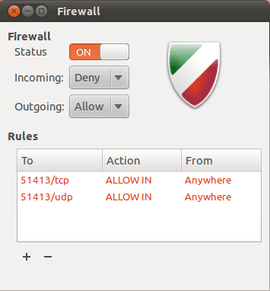Uncomplicated Firewall
| Stable release |
0.35-2[1]
/ October 1, 2016 |
|---|---|
| Repository |
|
| Written in | Python |
| Operating system | Linux |
| License | GNU General Public License |
| Website |
launchpad |
Uncomplicated Firewall (UFW) is a program for managing a netfilter firewall designed to be easy to use. It uses a command-line interface consisting of a small number of simple commands, and uses iptables for configuration. UFW is available by default in all Ubuntu installations after 8.04 LTS.[1]
GUIs for Uncomplicated Firewall
 GUI for Uncomplicated Firewall | |
| Original author(s) | Gufw Developers |
|---|---|
| Stable release |
16.10.0-1
/ October 1, 2016 |
| Repository |
|
| Written in | Python, PyGObject |
| Operating system | Linux |
| Platform | GTK+ |
| Available in | More languages |
| License | GNU General Public License |
| Website |
gufw |
| Developer(s) | KLajos et al. |
|---|---|
| Repository |
|
| Operating system | Linux |
| Platform | Qt |
| License | GNU General Public License |
| Website |
www |
| Repository |
|
|---|---|
| Operating system | Linux |
| Platform | Qt |
| License | GNU General Public License |
| Website |
kde-apps |
| Original author(s) | Darwin Bautista |
|---|---|
| Stable release |
0.3.2
/ 2012 |
| Repository |
|
| Written in | Python, PyGTK |
| Operating system | Linux |
| Platform | PyGTK |
| License | GNU General Public License |
| Website |
github |
Gufw is an easy, intuitive graphical user interface for managing Uncomplicated Firewall. It supports common tasks such as allowing or blocking pre-configured, common P2P, or individual ports. Gufw has been designed for Ubuntu, but is also available in Debian-based distributions and in Arch Linux; anywhere Python, GTK+ and UFW are available.
Features
| Netfilter feature [2] | 0.16.2 (8.04 LTS) | 0.30 (10.04 LTS) | 0.31.1-1 (12.04 LTS) | 0.34-0 (14.04 LTS) | 0.35-0 (16.04 LTS) |
|---|---|---|---|---|---|
| Default incoming policy (allow/deny) | Yes | Yes | Yes | Yes | Yes |
| Allow/deny incoming rules | Yes | Yes | Yes | Yes | Yes |
| IPv6 | Yes | Yes | Yes | Yes | Yes |
| Status | Yes | Yes | Yes | Yes | Yes |
| Logging (on/off) | Yes | Yes | Yes | Yes | Yes |
| Extensible framework | Yes | Yes | Yes | Yes | Yes |
| Application integration | - | Yes | Yes | Yes | Yes |
| Limit incoming rules (rate limiting) | - | Yes | Yes | Yes | Yes |
| Multiport incoming rules | - | Yes | Yes | Yes | Yes |
| debconf/preseeding | - | Yes | Yes | Yes | Yes |
| Default incoming policy (reject) | - | Yes | Yes | Yes | Yes |
| Reject incoming rules | - | Yes | Yes | Yes | Yes |
| Rule insertion | - | Yes | Yes | Yes | Yes |
| Log levels | - | Yes | Yes | Yes | Yes |
| Per rule logging | - | Yes | Yes | Yes | Yes |
| Outgoing filtering (on par with incoming) | - | Yes | Yes | Yes | Yes |
| Filtering by interface | - | Yes | Yes | Yes | Yes |
| Bash completion | - | Yes | Yes | Yes | Yes |
| Upstart support | - | Yes | Yes | Yes | Yes |
| Improved reporting | - | Yes | Yes | Yes | Yes |
| Reset command | - | Yes | Yes | Yes | Yes |
| rsyslog support | - | Yes | Yes | Yes | Yes |
| Delete by rule number | - | Yes | Yes | Yes | Yes |
| Python 2.6 support | - | - | Yes | Yes | Yes |
| 'show listening' report | - | - | Yes | Yes | Yes |
| Python 2.7 support | - | - | Yes | Yes | Yes |
| Increased protocol support (ah, esp) | - | - | Yes | Yes | Yes |
| IPv6 rate limiting via 'limit' command | - | - | - | Yes | Yes |
| Python 3.2 support | - | - | - | Yes | Yes |
| Python 3.3 support | - | - | - | Yes | Yes |
| 'show added' report | - | - | - | Yes | Yes |
| Python 3.4 support | - | - | - | Yes | Yes |
| Before/after extensibility hooks | - | - | - | Yes | Yes |
| Routed packet filtering (FORWARD) | - | - | - | Yes | Yes |
| systemd support | - | - | - | - | Yes |
| Increased protocol support (igmp, gre) | - | - | - | - | Yes |
| Python 3.5 support | - | - | - | - | Yes |
| Snappy for Ubuntu Core support | - | - | - | - | Yes |
| Per rule comments | - | - | - | - | Yes |
References
- 1 2 "UncomplicatedFirewall". Ubuntu.com. Retrieved 21 November 2016.
- ↑ "UFW in Ubuntu". Ubuntu.com. Retrieved 21 November 2016.
External links
This article is issued from
Wikipedia.
The text is licensed under Creative Commons - Attribution - Sharealike.
Additional terms may apply for the media files.